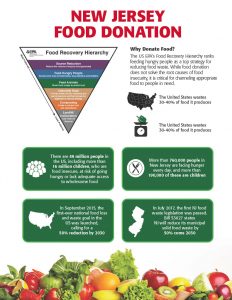Health Inspectors & Food Donation
Health inspectors have the opportunity to encourage food facilities, such as restaurants and cafeterias, to participate in food donation. Preventing food from contributing to waste by redistributing it to those in need helps tackle food insecurity, benefits the environment, and helps to reserve resources.
Many food facilities are unaware of food donation protocols and feel discouraged from donating food due to a lack of knowledge. Health inspectors can play an active role in food waste reduction by educating food facilities on how to keep excess food in proper condition to be donated and how to successfully donate food. Food facilities that donate food are protected from liability by the Bill Emerson Good Samaritan Food Act[1].
A well-informed and involved health inspector can make a big difference in preventing food waste. Rutgers Cooperative Extension partnered with Harvard Law School Food Law and Policy Clinic to create legal fact sheets for New Jersey food donations.




Are you a health inspector looking to do your part in reducing food waste? Rutgers Cooperative Extension partnered with Sustainable Jersey and Center for EcoTechnology to create a guidance document and brochure that outlines the basics of food donation. Health inspectors are encouraged to distribute these documents throughout their municipality. Be part of the solution by taking our 1-hour, self-paced training course for health inspectors.


Foods/beverages that can be donated
- Hot food kept at proper temperature and/or cooled properly
- Cold food kept at proper temperature
- Produce
- Beverages
- Packaged items
- Dairy products
- Raw meat
Foods/beverages that cannot be donated
- Foods in dented or rusty cans
- Unwholesome food or foods displaying signs of spoilage
- Foods in opened or torn containers
- Distressed foods that have been exposed to unsafe conditions such as fire or smoke
- Time/Temperature Controls for Safety (TCS) foods that were not kept at proper temperature